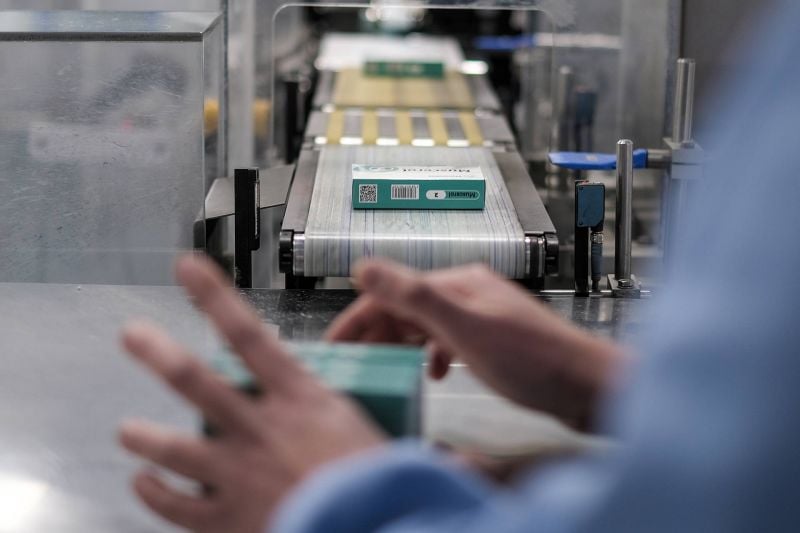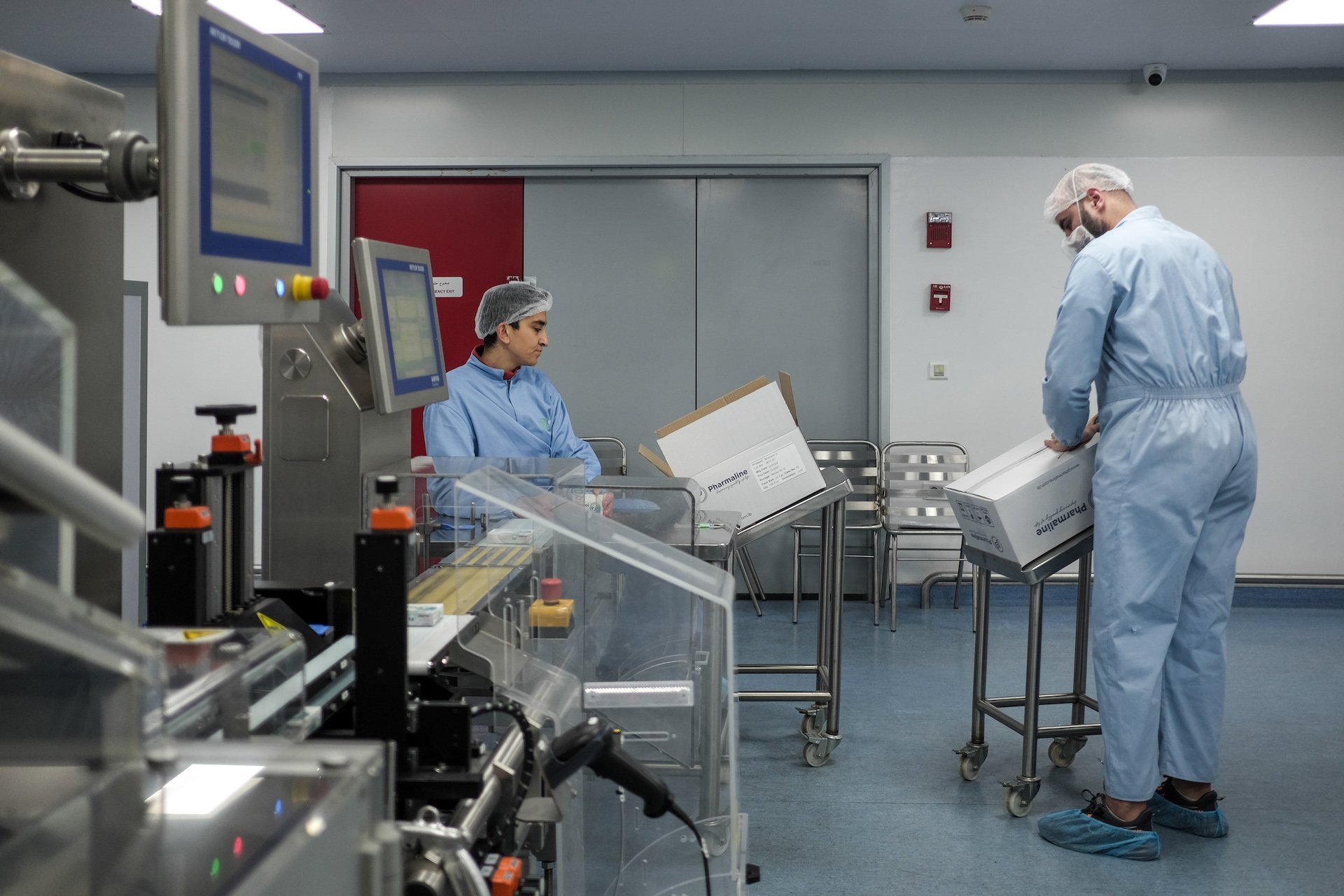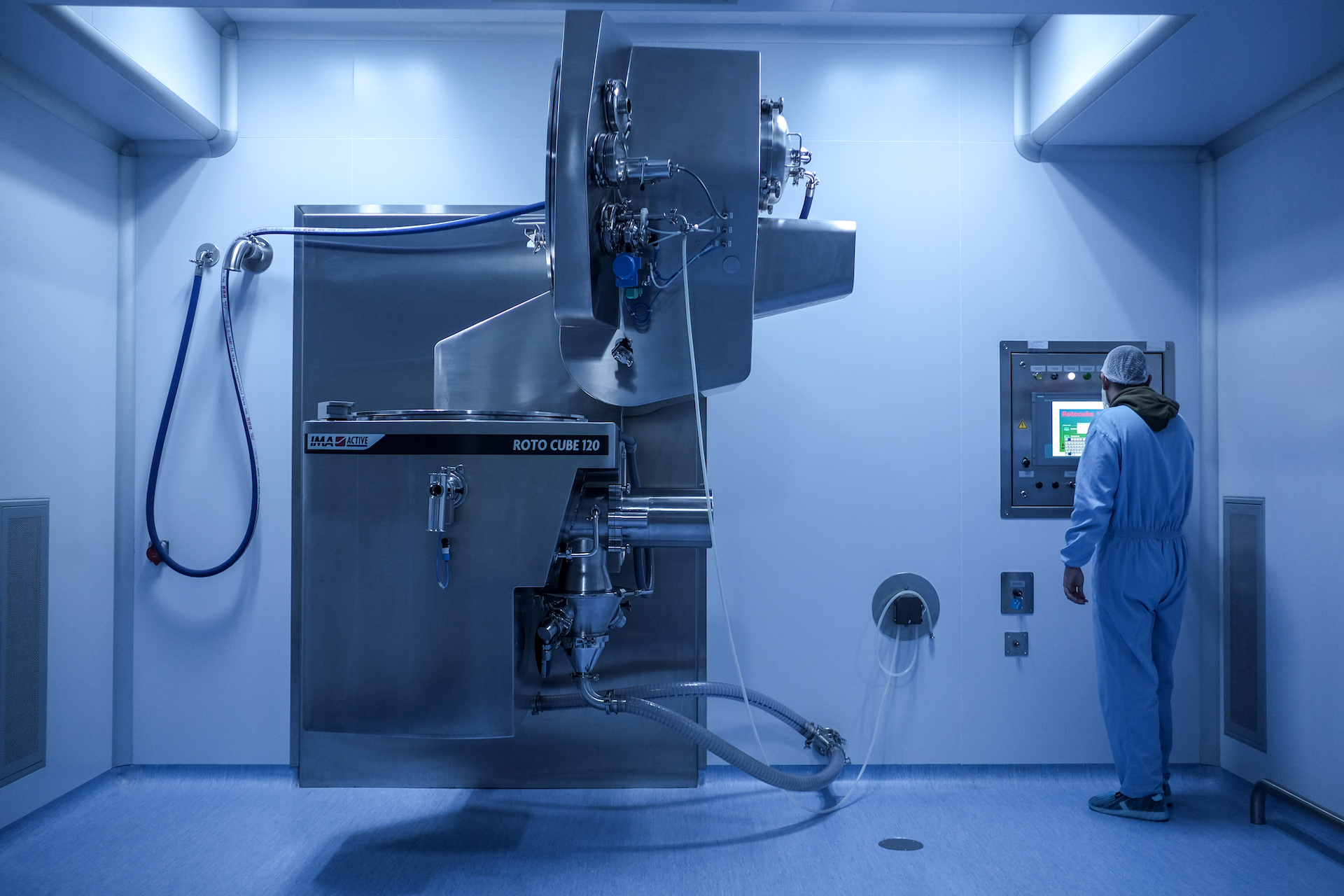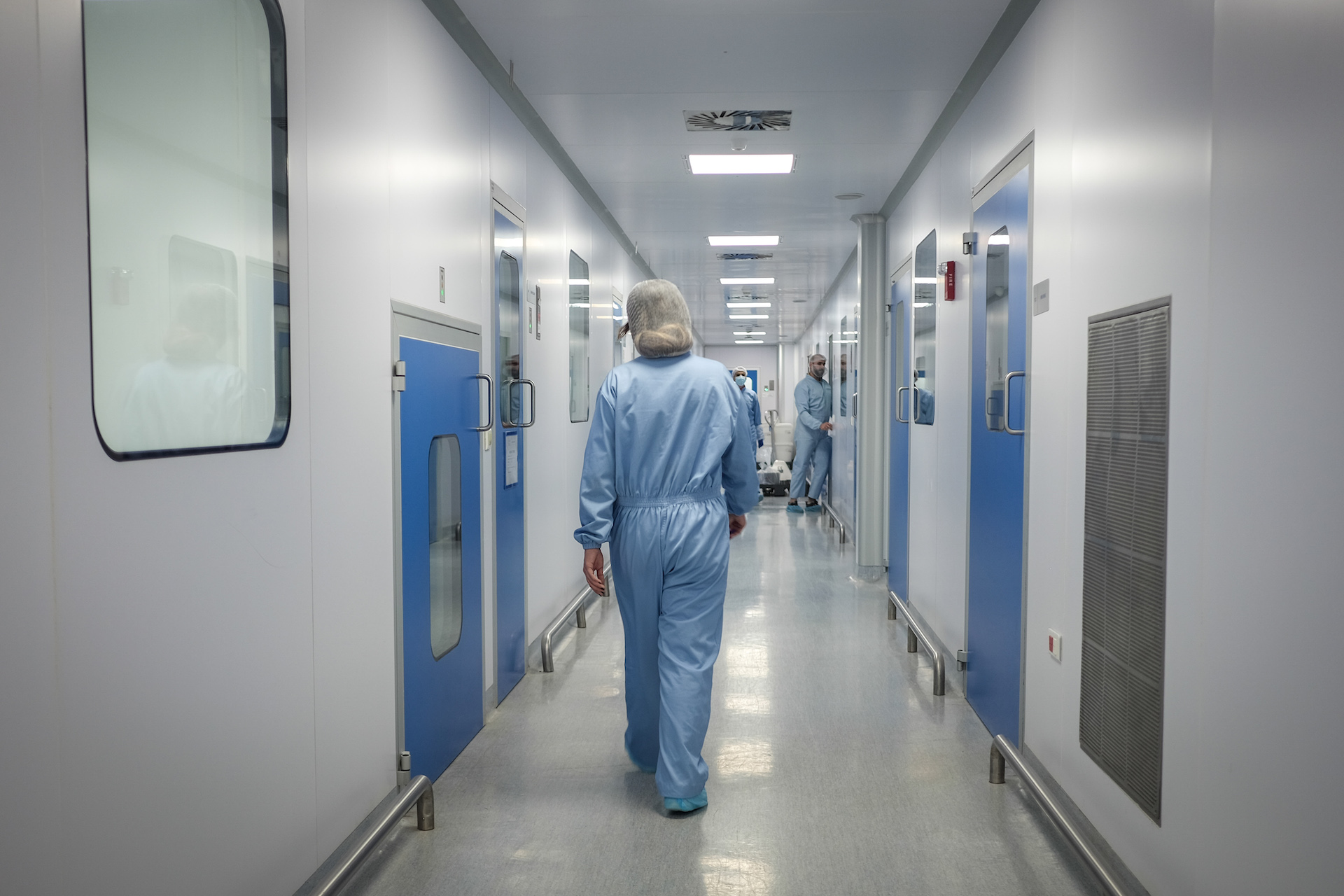
The Pharmaline plant in Nahr Ibrahim, Lebanon on March 11, 2024. (Credit: João Sousa/L'Orient Today)
BEIRUT — Nearly five years into its most severe economic crisis, Lebanon has seen its economic sectors and domestic industries decimated — all but an unexpected few.
The local pharmaceutical industry has boomed as local manufacturers step in to fill the gaps in the market that were once filled by imported alternatives.
According to Dr. Carole Abi Karam, president of the Syndicate of Pharmaceutical Industries in Lebanon (SPIL) and general manager of Pharmaline (a Lebanese pharmaceutical company), the market share of locally manufactured drugs tripled from 10 percent to 30 percent of all medicines in the last three years.
Before Lebanon’s financial crisis began in 2019, she added, SPIL encompassed 11 homegrown Lebanese companies. Just two of those companies covered 100 percent of the local market’s needs for serum products. The remaining nine drug manufacturers offered medication for chronic ailments (diabetes, hypertension, cancer and others) and essential medication such as paracetamol.
Even so, back then SPIL dominated only 10 percent of the total market share, said Abi Karam. The rest were imports from multinationals and regional pharma companies.
 The Pharmaline plant in Nahr Ibrahim, Lebanon on March 11, 2024. (Credit: João Sousa/L'Orient Today)
The Pharmaline plant in Nahr Ibrahim, Lebanon on March 11, 2024. (Credit: João Sousa/L'Orient Today)
“Lebanon used to be [and remains] a country heavily reliant on imports, which resulted in barriers to grow the country’s pharma industry,” she added.
One explanation for that reliance on imports is that consumers are mostly inclined to choose the “original” foreign product over the local alternative with the same chemical makeup, or other generics available on the market, said Salim Zeenni, president of the Association of Lebanese Industrialists (ALI). He noted that this is the case all around the world, and not only in Lebanon.
“The main barrier was the limited awareness of Lebanese patients, who always favored foreign products compared to local alternatives,” said Abi Karam.
Multinational and regional pharmaceutical companies also established offices at the time in Lebanon with huge budgets for marketing and promotion, giving them a competitive advantage over local manufacturers who could not always keep up.
Still, according to Abi Karam, “the platform, technical capabilities, technology and human capital [of the local pharmaceutical industry] were already in place” to develop, grow and meet market demand. They just needed their time in the spotlight.
The tides turn
And then 2019 happened. The Lebanese lira began to spiral in value, thousands of people lost their life savings and thousands more were thrust into poverty.
 The Pharmaline plant in Nahr Ibrahim, Lebanon on March 11, 2024. (Credit: João Sousa/L'Orient Today)
The Pharmaline plant in Nahr Ibrahim, Lebanon on March 11, 2024. (Credit: João Sousa/L'Orient Today)
The currency devaluation caused many international pharmaceutical companies to either reduce their activity or exit the Lebanese market altogether.
“The overall pharmaceutical market shrunk by almost 50 percent in value between 2020 and 2023, due to the crisis, and mainly due to a drop in the imports of international drugs,” explained Nabil Ghorayeb, director of human health and manufacturing at Algorithm, one Lebanese pharmaceutical manufacturer.
Similar to importers of international brands, local manufacturers faced the same, if not bigger challenges, at the beginning of the crisis.
“The subsidies granted to local manufacturers were lower than those granted for importers,” said Abi Karam. At a time when importers were still getting a 100 percent subsidy over their prices, the local industries were only granted subsidies over the cost of imported raw materials used in their production processes.
“We were getting subsidies over 85 percent of the cost of our raw materials, and raw materials make up only around 30 percent of our total production costs.”
As the value of the lira tumbled, the Lebanese government started gradually lifting its subsidies in the market. That, plus dollar shortages, made it impossible for importers to settle the fees of imported drugs — the imported medicines subsequently went missing from pharmacy shelves across Lebanon.
 The Pharmaline plant in Nahr Ibrahim, Lebanon on March 11, 2024. (Credit: João Sousa/L'Orient Today)
The Pharmaline plant in Nahr Ibrahim, Lebanon on March 11, 2024. (Credit: João Sousa/L'Orient Today)
An exponential increase in the price of imported medications — if you could lay hands on them at the time — caused the local pharma industry to step in to fill those gaps.
“At Pharmaline, we took the decision ... to develop new products within different therapeutic categories. We made expansion in the line of diabetes drugs, antibiotics, antiepileptics, anticoagulants, and even oncology ones,” Abi Karam told L’Orient Today.
Algorithm took a similar direction, according to Ghorayeb, expanding its lines of cardiovascular, diabetes, dyslipidemia (imbalance of lipids such as cholesterol), and other drugs.
“We had to upgrade our operations rapidly to supply the local market and prevent shortages of critical medications,” said Ghorayeb.
A ‘steady and solid’ growth
Today, on average, the industry is providing drugs that are 40 to 50 percent more affordable than imported brand alternatives, and 20 to 30 percent more competitive than many imported generics, according to Abi Karam and Ghorayeb.
Joe Salloum, president of the Lebanese Order of Pharmacists, confirmed the cheaper prices to L’Orient Today.
Alongside the eleven existing manufacturers expanding and diversifying their portfolios, a new company — Serum and Solutions — entered the serum market, by setting up manufacturing sites for serum in the Bekaa area in 2020. This led SPIL to go from covering only 10 percent of the market, to 30 percent today.
The combined fixed assets of SPIL members currently stand at around $650 million, up from $500 million before the crisis, according to Abi Karam. This number excludes the working capital that is invested to cover manufacturing operations across the industry and investments in research and development.
Ghorayeb estimated that each plant, whether large or small, has major yearly capital expenditure (a cash or credit payment to purchase long-term physical or fixed assets used in a business’s operations) ranging between $500,000 to $3 million per year.
“These investments are crucial because ours is a ‘capital-intensive’ industry, and not a labor-intensive one.” That is, pharmaceuticals spend extensively on automated machinery and equipment and relatively less on a large workforce.
And those investments could only continue to go up amid growing local demand.
“Domestic sales increased by 85 percent over the last three years at Pharmaline, and while exports remain shy — due to protectionist measures implemented in neighboring countries — we’ve managed to double them over the same period,” stated Abi Karam.
Ghorayeb also reported a significant increase in sales volume, up from six to seven million medication packs sold per year before the crisis, to around 11-12 million packs per year today, and Algorithm’s export base remains quite strong. “We’re gradually recovering the hit we faced at the beginning of the economic deterioration, partly due then to the shortage of foreign currency in the country to pay for trade activities.”
The pharmaceutical industry’s expansion has also meant job creation.
SPIL had a combined total of approximately 1,800 employees in 2020, and some 2,200 employees in 2022, an increase of 22 percent.
As they’re expanding their operations, Pharmaline and Algorithm say they are both recruiting for quality control, business development, and research and development.
An attractive market, despite turmoil
Moreover, three new Lebanese companies are “getting ready to invest” in the local pharma sector, said Abi Karam.
One of those investors, Lebanese company USBA Pharma Industries, has “already finalized the set up of a new plant in the North of Lebanon,” said Abi Karam. The plant will soon produce and supply the local market with newborn and infant formula, “a product that went out of stock during the crisis,” according to Abi Karam.
Executive director and owner of USBA Pharma Industries, Zakaria el Sayed, told L’Orient Today that the plan to open a new manufacturing site began in 2020.
The onset of the COVID-19 pandemic — coupled with the shortage of medicine in the country at the time — made him and his siblings, who are also businesspeople, consider investing locally.
“We decided to open a new drug manufacturing company because we saw a significant need for it in today’s Lebanese market [amid ongoing shortages],” said Sayed.
The company is set to become the first manufacturer of baby formula in Lebanon and the new plant will also include seven lines of production (eye drops, syrup, creams, and others). The products are scheduled to hit the market in April this year.
The industry’s growth doesn’t come without risks, including the threat of a growing war in southern Lebanon.
In case of a full escalation with Israel, Abi Karam’s company Pharmaline is prepared, she asserted. The company has a contingency plan in place, or a “business continuity plan” as she calls it. They review the plan on a monthly basis and set the necessary mitigation actions in place. By doing so, they hope to avoid any future medicine shortages.
Despite the instability, “we’re still investing and believing in our country and talents, and will continue to expand our operations” Abi Karam said.
Philippe Hage Boutros also contributed to this article.